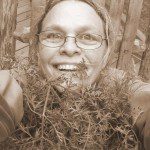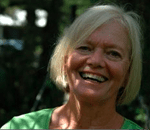Molly is a certified birth educator, writer, and activist who lives in central Missouri. She is an editor, a breastfeeding counselor, a professor, and doctoral student in women’s spirituality. She blogs about birth, motherhood, and women’s issues at Talk Birth and about thealogy at http://goddesspriestess.com
I have a thealogical view of the world/universe as the body of the Goddess. Everything is interconnected in a great and ever-changing dance of life. Not as “all one,” but as all interconnected and relating to one another, in an ever-present ground of relationship and relatedness. I was meaningfully touched by Carol Christ’s book, She Changes: Re-imagining the Divine in the World, and I feel I connected with her conceptions of a feminist process philosophy in many ways. As does she, I imagine the divine as omnipresent (rather than omnipotent) and I feel like I can see Goddess/God in the bright black eyes of a newly hatched baby chick and in the curve of my baby’s cheek against my breast. I do not feel like the Goddess is something I believe in, but a reality that I experience in daily life.
While perhaps it sounds silly on the surface, baby chicks are truly one of the things that make me believe in “the Goddess.” When I sit before a nest and see the bright black eyes and soft down of a new baby chick, where before there was just an egg, I feel like I am truly in the presence of divinity. This, this is Goddess, I think whenever I see one. There is just something about the magic of a new chick that brings the miracle of the sustaining force of life to my attention in a profound way. (New babies of all kinds do it for me, but there is something extra special about chicks!) When one of these chicks dies, to me, is part of Goddess/Nature/Life Force too. I do not believe in a controlling/power-over deity who can give life or take it away at will or at random. I know that things just happen, that the wheel keeps turning, and that while that force that I name Goddess is ever-present and able to be sensed and felt in the world and in daily life, it/She does not have any kind of ultimate “control” over outcomes.
I connect to Karen Tate’s descriptions of Goddess as “deity, archetype, and ideal.” I also like Starhawk’s description of what Goddess means to her: “It all depends on how I feel. When I feel weak, she is someone who can help and protect me. When I feel strong, she is the symbol of my own power. At other times I feel her as the natural energy in my body and the world.” While this sounds perfect to me, this fluid conceptualization of divinity is profoundly and dramatically challenging to traditional religious structures. Sometimes for me the Goddess is a symbol—of my own personal power, of Nature, and of women’s strength and value—sometimes, like during the death/birth of my third son, She is a literal presence in my life. My third son died during my second trimester of pregnancy and my birth-miscarriage experience with him was a powerful and transforming experience. I was left with a sense of openness to change. A receptivity to larger forces and powers in the world. Indeed, it felt like a spiritual experience of sorts. Just as Carol Christ experienced a sense of, “love as the ground of being” after her mother died, I feel as if I literally experienced the presence of the Goddess in the death/birth of my tiny son. While a very practical, grounded, and realistic person, I also had several spontaneous Goddess “visions” in the months following my loss. After his birth and in my journey through grief, I experienced a sense of myself as inherently worthy and valuable—that I didn’t need to do anything special to be a worthwhile human being.
She became real for me in these moments. However, I do not feel like the Goddess is a literal deity in the common definition of the word—i.e. a removed from the world supernatural being, floating around in the heavens. I feel like She IS everywhere and I also recognize that this is a personalization of the more “generic” larger forces of the world that other people may or may not find useful or appropriate in their own lives—for example, some people might call it evolution, I call it Goddess. This force, this connecting “glue” that holds the universe together might be named by others “God” or “the Universe” or “Nature” or “Life Force” or “the Sacred” or “Divinity” or “the Tao”—I feel most satisfied when I personalize it as Goddess. Additionally, I have had a small handful of metaphysical types of experiences (like with my baby) that convince me that there is a personal aspect/experience of Goddess as well as a more impersonal, force-of-Nature-and-the-
As Esra Free notes in her book Wicca 404: “ To view the reality of the Great Goddess of Wicca for ourselves, we need look no further than our own bodies, our own planet, our own universe. Our Goddess is not some distant, invisible, disembodied spirit, nor is she “supernatural” in any way, shape or form. Our Goddess is Nature, in all its manifestations. From the inconceivable whole of the vast, living universe to that universe’s tiniest constituent particle, She is physically, spiritually, energetically and personally everywhere. All the time. The Great Goddess of Wicca is All That Is, past, present and future, here on Earth, in every distant corner of the physical cosmos, and in all the seen and unseen spaces in between. There is nothing you can look to that is not Her, that is not born of Her, that does not bear the imprint of Her essence…” Free also says, “Remember that what preserves the screen door is its openness, its ability to let the storm’s fury pass through. A closed door gets blasted to smithereens. If we think of our personal, intimate, experiential relationship with the Goddess as the doorframe, as that which maintains our ‘shape’ throughout the storm, solidly framing our identity and integrity as followers of the Goddess while the flood of life passes through our ‘screen,’ what do we have to fear from other Traditions?”
I have a friend who is a “recovering Christian.” She says that she can only put her trust in science now and will never again believe in something she cannot see. I dreamed that I was trying to explain to her my experiences and sense of the Goddess as real using my love for my baby as an example—telling her that you cannot see or prove my love for my baby, but I know without one scrap of doubt that this love exists in the world, because I experience and live it every day.
References:
Free HPS, Cosmic Goddess Coven Esra (2007-05-17). Wicca 404: Advanced Goddess Thealogy (Kindle Locations 408-414). New Paradigm Press. Kindle Edition.
Starhawk in “Why Women Need the Goddess” by Carol Christ in Carol P. Christ and Judith Plaskow, eds., Womanspirit Rising: A Feminist Reader on Religion (San Francisco: Harper & Row, 1979), 273-287












